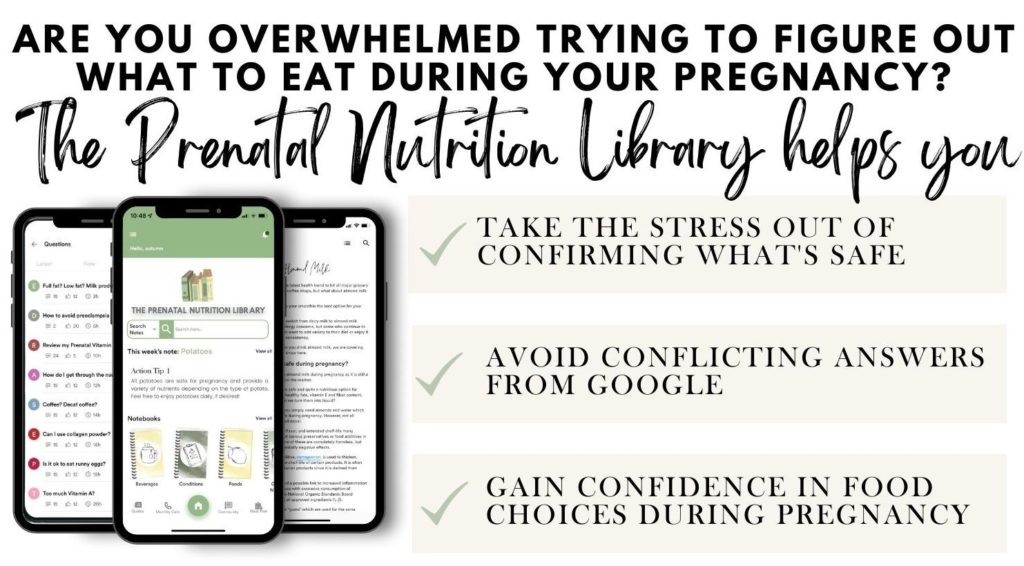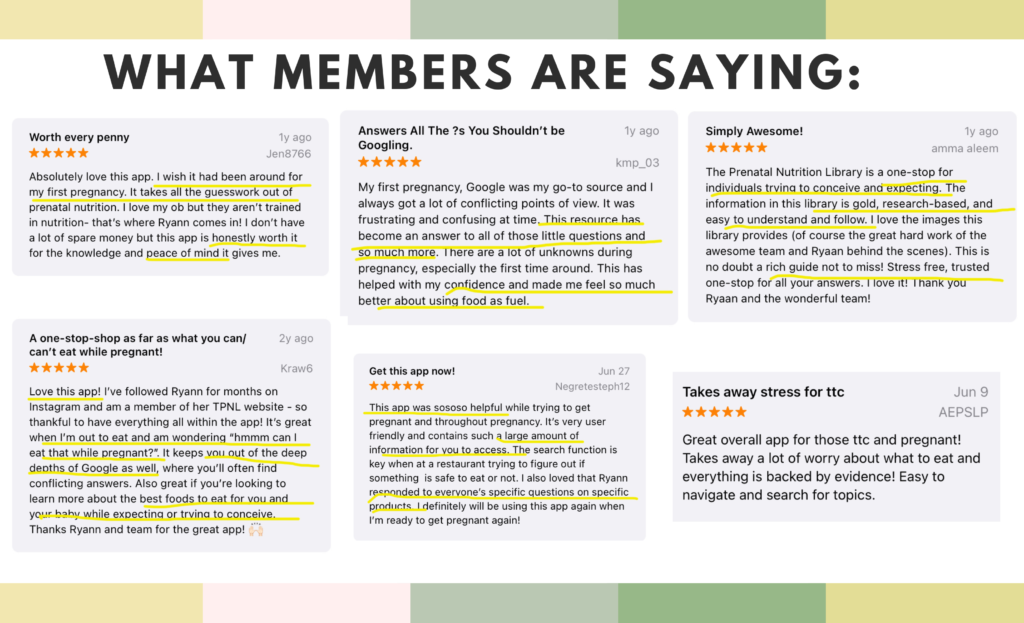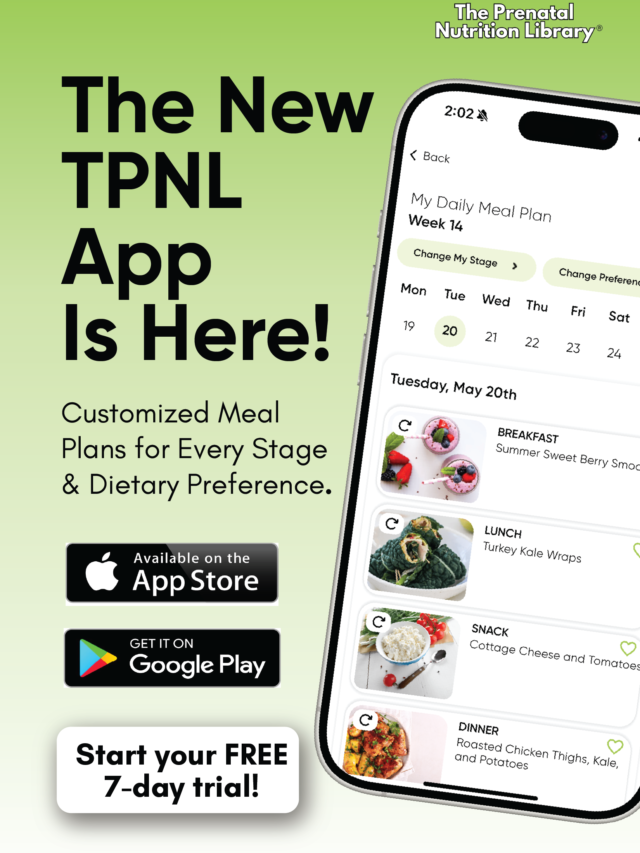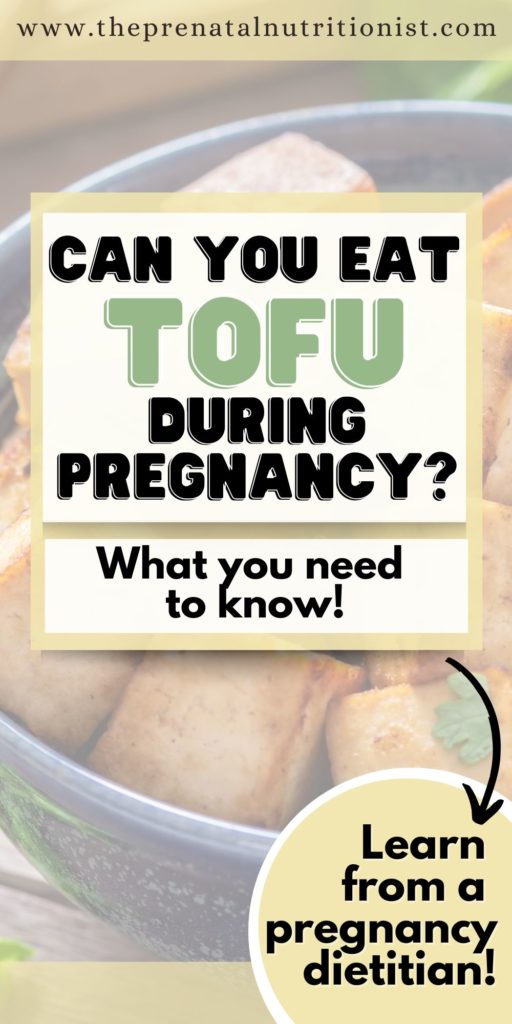
Eating a wide variety of foods during pregnancy helps to ensure you’re getting a variety of nutrients. A healthy and balanced diet can help you and your growing little one receive all the necessary nutrients during pregnancy, including calcium, folate, iron, and protein. These nutrients are essential for fetal growth and development.
While we know how important nutrition is, we also know navigating food choices during pregnancy can be a little tricky. One person will say something is perfectly fine, while another says it puts you and your baby at risk. If you want to avoid all the confusion and stress of navigating food choices during pregnancy, sign up for The Prenatal Nutrition Library app. You can easily search and find the answers to all your questions without the stress and hassle of navigating what is safe to eat during pregnancy.
One of the foods that often raises questions is tofu. Is it safe to consume? What are the health benefits of eating tofu during pregnancy? We will dive into this topic in more detail below!
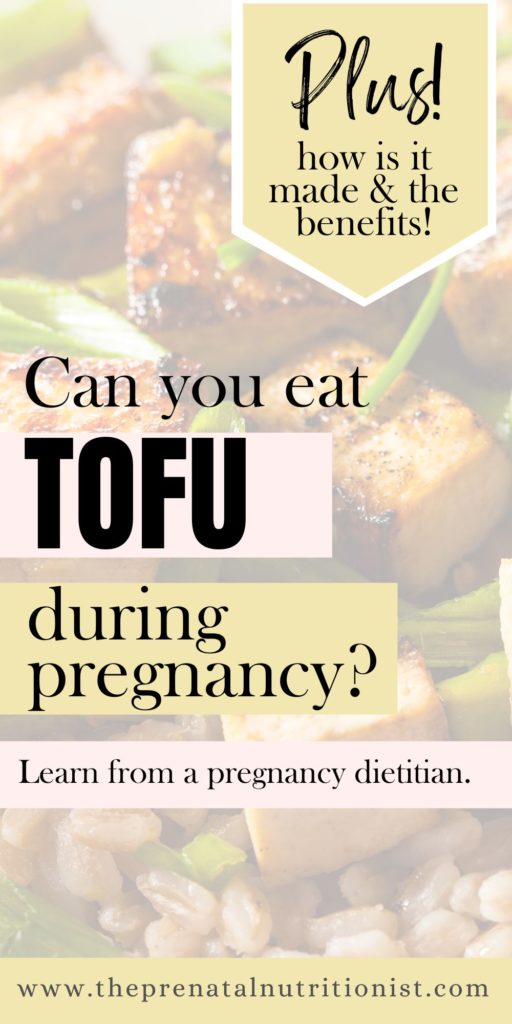
Can You Eat Tofu While Pregnant? Let’s Explore!
Tofu is a versatile food eaten around the world. It may be enjoyed in soups, stir-fries, curries, and more. Made from soybeans, it’s known for its higher protein content as a plant-based food. It’s most commonly used in vegetarian and vegan diets, but even meat-eaters enjoy this food. Tofu is a safe option to enjoy during pregnancy.
Eating tofu during pregnancy as part of a balanced diet offers a good source of essential nutrients for you and your baby. However, like most things in nutrition, moderation is key. There are a lot of myths and concerns about soy intake during pregnancy. It’s important to know there’s a nutrition and health difference between highly processed forms of soy and more whole food forms of soy like edamame, tempeh, and tofu.
Soy does contain antinutrients, compounds that interfere with the absorption of other nutrients. Washing, soaking, and enjoying soy foods in moderation can help combat this. Antinutrients aren’t only found in soy; they are also found in other legumes, seeds, and grains.
What Is Tofu Made From?
Tofu is made from dried soybeans, soaked in water, crushed, and boiled. The result is a delicious and versatile food. The more detailed process of making tofu is as follows:
- Soaking: Dried soybeans are completely soaked in water for several hours, or even better, overnight, to soften them.
- Blending: The soaked soybeans are blended with fresh water to create a thick slurry. This mixture is not yet soy milk but will become soy milk after cooking.
- Cooking: The mixture is cooked to create a more intense flavor and improve nutrient extraction.
- Straining: After cooking, the mixture is strained through a cloth or fine mesh to separate the liquid soy milk from the solid pulp, called okara.
- Coagulating: The soy milk is then heated up again and mixed with a coagulant. Usually, this is magnesium chloride, calcium sulfate, or lemon juice. This helps the proteins and fat curdle, forming solid curds.
- Pressing: The curds are collected and pressed into molds to remove excess liquid. The amount of pressure used and the time spent affect the texture of the tofu. This will help you create either silken, firm, or extra-firm tofu.
- Cooling and Storing: After pressing, the tofu is cooled down and then can be stored in water to keep it nice and fresh.
Can Pregnant Women Eat Tofu?
Yes! Pregnant women can safely eat tofu in moderation, which can be a beneficial addition to their diet, especially for vegetarians. Tofu is what many people refer to as a “plant-based protein” that works as a meat substitute during pregnancy. It’s also jam-packed with essential nutrients, including calcium and magnesium, which are crucial during this time. However, if you can, it is important to include a variety of other protein sources in your diet, too!
Tofu does supply some non-heme iron, which is needed to prevent anemia and iron deficiency during pregnancy. However, it is non-heme iron, which is not as well absorbed as heme sources of iron, like red meat. Additionally, tofu is a good source of calcium, which can reduce iron absorption, especially from non-heme sources.
The bottom line? Don’t rely on tofu to meet all your iron needs during pregnancy! Adding tofu to your meals now and then can be a part of a well-balanced, nourishing diet that supports a healthy pregnancy. Again, as said above, moderation is key.
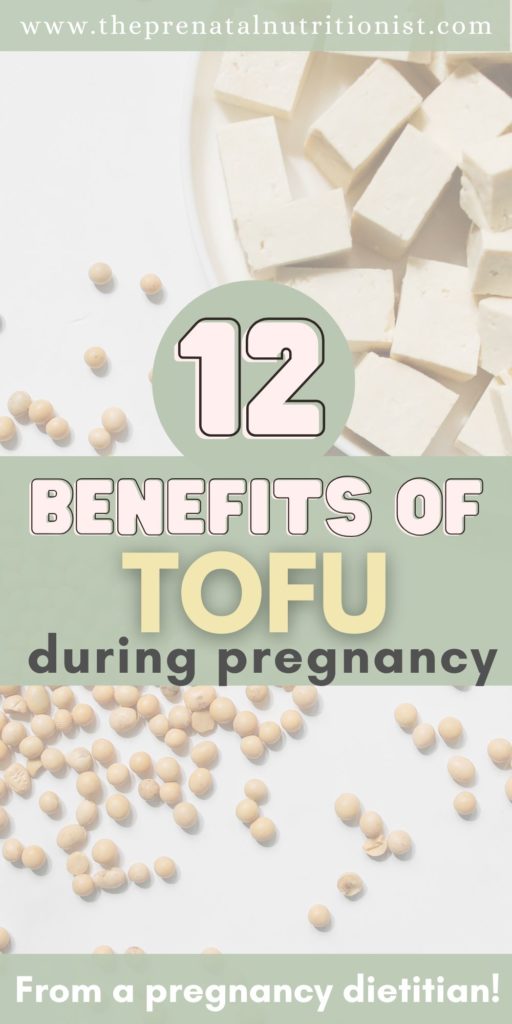
Tofu Benefits For Pregnant Women
- Plant-based protein
- Contains some non-heme iron
- Good source of calcium
- Contains essential amino acids
- Rich in isoflavones, which benefit health
- Versatile
- Easy to prepare
- Source of folate
- Generally easy to digest
- Source of magnesium
- Safe for pregnancy
- Balance of protein and fiber, which may make it a plant-based gestational diabetes-friendly choice
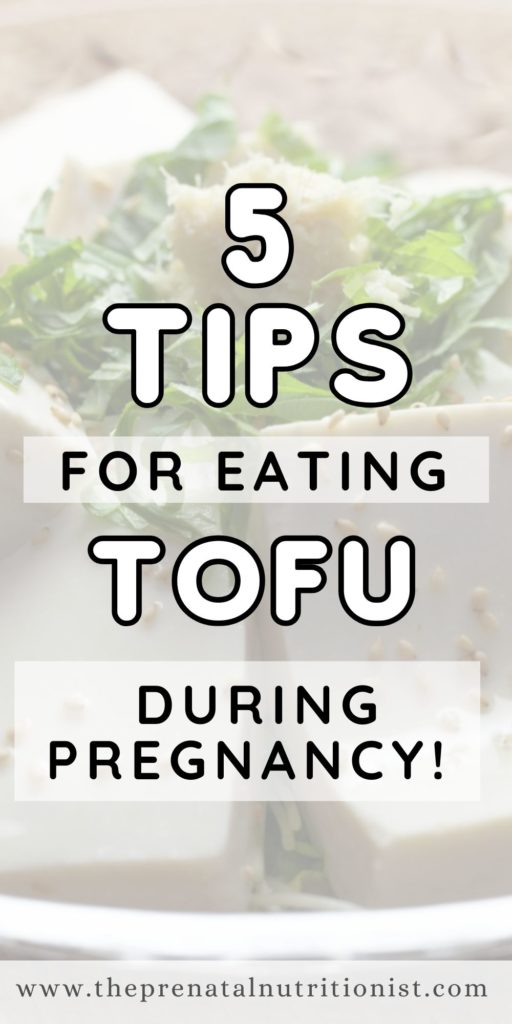
Tips for Eating Tofu When Pregnant
Eat it in moderation.
While tofu is nutritious and generally safe during pregnancy, aim for moderate consumption. Up to a few servings per week should be fine and allow room for plenty of other protein sources and nutrient-rich foods in the diet. Don’t be scared about the whole ‘moderation’ thing. This is a normal rule for pretty much anything during pregnancy. Relying on ANY one food or drink isn’t ideal.
Choose organic tofu.
If your budget allows, you may want to opt for organic tofu. Choosing organic can help minimize exposure to genetically modified organisms (GMO) soy. GMO soybeans have been found to contain more glyphosate residue than organic soybeans. Determining whether glyphosate affects pregnancy and birth outcomes is still under investigation. It’s a hotly debated topic. Learn more about the research on soy in The Prenatal Nutrition Library app.
Press and marinate tofu.
Press the tofu before cooking to remove excess water and achieve a firmer texture. Place it between paper towels or a clean kitchen towel, and apply pressure using a heavy object (like a pan) for 15-30 minutes. This helps tofu absorb marinades better and crisp up when cooked. Tofu is like a sponge and absorbs flavors well. Marinate it for at least 30 minutes in sauces like soy sauce, garlic, ginger, lemon, or herbs to enhance its taste.
Watch out for any allergies.
If you have a soy allergy, you will want to avoid tofu. Soy is one of the top common allergens, and as mentioned above, tofu is made from soybeans. No worries! Plenty of other nourishing, protein-rich foods can be included during pregnancy. Tofu is not a necessity. Dairy, other legumes, hemp, chia seeds, and eggs are all foods to include if you are vegetarian.
Eat tofu as part of a balanced diet.
Combine tofu with vegetables and quality fats to create balanced meals. You can also add a portion of whole grains to boost the fiber intake of the meal. Balanced meals with protein, fat, and fiber help to support well-managed blood sugar levels. Balanced blood sugar levels are essential for everyone during pregnancy!
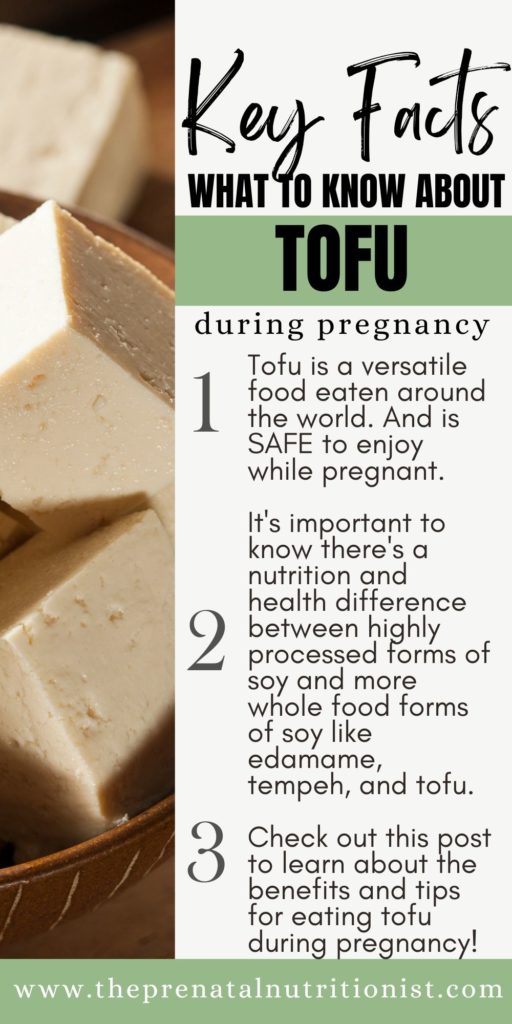
Are you meeting your protein needs during pregnancy?
Looking for a plant-based protein option to include in your diet during pregnancy? If so, tofu might be the treat for you! Just make sure you include plenty of other protein sources in your diet, too!
Are you struggling to meet protein goals during pregnancy? Did you know that some protein shakes are pregnancy-safe? I have a whole list of the best protein shakes for pregnancy! With these recipes, you can easily and quickly boost your protein intake. If you’d like more tips and information on determining how much protein you should eat during pregnancy, check out The Prenatal Nutrition Library app! It’s your one-stop shop for evidence-based pregnancy nutrition information, meal plans, and more.



